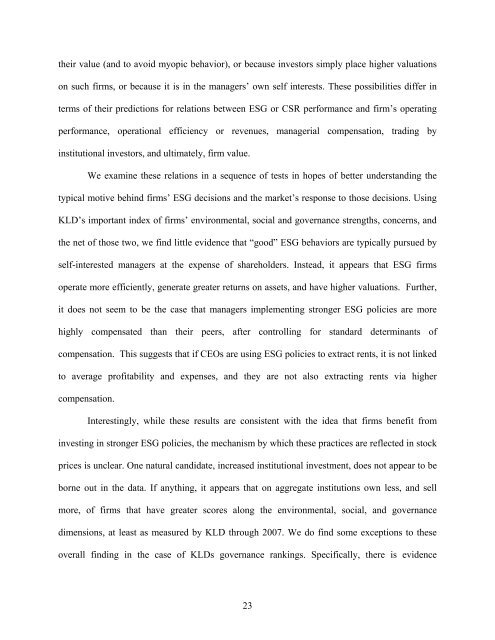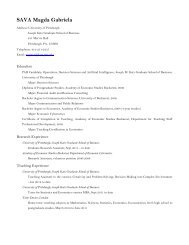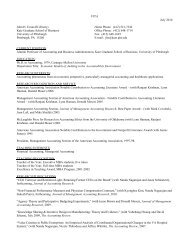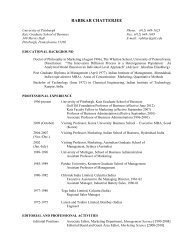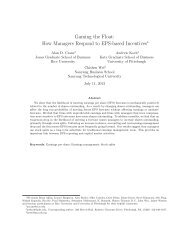Stuart L. Gillan, Jay C. Hartzell, Andrew Koch, and ... - Pitt Business
Stuart L. Gillan, Jay C. Hartzell, Andrew Koch, and ... - Pitt Business
Stuart L. Gillan, Jay C. Hartzell, Andrew Koch, and ... - Pitt Business
Create successful ePaper yourself
Turn your PDF publications into a flip-book with our unique Google optimized e-Paper software.
their value (<strong>and</strong> to avoid myopic behavior), or because investors simply place higher valuations<br />
on such firms, or because it is in the managers’ own self interests. These possibilities differ in<br />
terms of their predictions for relations between ESG or CSR performance <strong>and</strong> firm’s operating<br />
performance, operational efficiency or revenues, managerial compensation, trading by<br />
institutional investors, <strong>and</strong> ultimately, firm value.<br />
We examine these relations in a sequence of tests in hopes of better underst<strong>and</strong>ing the<br />
typical motive behind firms’ ESG decisions <strong>and</strong> the market’s response to those decisions. Using<br />
KLD’s important index of firms’ environmental, social <strong>and</strong> governance strengths, concerns, <strong>and</strong><br />
the net of those two, we find little evidence that “good” ESG behaviors are typically pursued by<br />
self-interested managers at the expense of shareholders. Instead, it appears that ESG firms<br />
operate more efficiently, generate greater returns on assets, <strong>and</strong> have higher valuations. Further,<br />
it does not seem to be the case that managers implementing stronger ESG policies are more<br />
highly compensated than their peers, after controlling for st<strong>and</strong>ard determinants of<br />
compensation. This suggests that if CEOs are using ESG policies to extract rents, it is not linked<br />
to average profitability <strong>and</strong> expenses, <strong>and</strong> they are not also extracting rents via higher<br />
compensation.<br />
Interestingly, while these results are consistent with the idea that firms benefit from<br />
investing in stronger ESG policies, the mechanism by which these practices are reflected in stock<br />
prices is unclear. One natural c<strong>and</strong>idate, increased institutional investment, does not appear to be<br />
borne out in the data. If anything, it appears that on aggregate institutions own less, <strong>and</strong> sell<br />
more, of firms that have greater scores along the environmental, social, <strong>and</strong> governance<br />
dimensions, at least as measured by KLD through 2007. We do find some exceptions to these<br />
overall finding in the case of KLDs governance rankings. Specifically, there is evidence<br />
23


